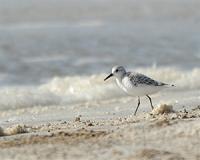| . |  |
. |
Tel Aviv, Israel (SPX) Aug 06, 2010 It's taken millions of dollars to cap it, and it could take billions more to clean it up. BP's oil spill in the Gulf of Mexico is acknowledged the environmental catastrophe of the century. But Tel Aviv University has a solution that may help "bioremediate" the remaining problems. Prof. Eugene Rosenberg and Prof. Eliora Ron of Tel Aviv University's Department of Molecular Microbiology and Biotechnology are using naturally occurring oil-munching bacteria, grown at the TAU lab, to clean the hard-to-reach oil pockets that occur when oil mixes with sand and organic matter on beaches and forms a thin layer on the Gulf's precious waterways. "It's worked to clean up an oil spill on the coast of Haifa, Israel, so we've already got good evidence it could work in Florida too," says Prof. Ron. Details of their decades of research appear in The Handbook of Hydrocarbon and Lipid Microbiology, published this year by Springer Verlag.
Using nature itself to fight contamination Prof. Ron says that sucking up surface oil pools and containing the oil are important and necessary first-step actions. But her solution addresses the smaller amounts of oil left behind - that which isn't easily removed from sand and water. It is this small percentage of oil that sits under rocks and forms a thin film on the water's surface. Her bacterial solution can remove this oil, which is necessary to protect the sea's wildlife. "We see sad pictures of birds covered in oil and people with good intentions cleaning bird wings," says Prof. Ron. "But by the time the oil is on their wings, it's too late. Birds die because oil gets into their lungs."
Going the last mile Featured in Time magazine in the 1970s, the bacterial bioremediation solution developed at Tel Aviv University has been applied to clean out the bilges of oil tankers at sea and is used around the world.
Share This Article With Planet Earth
Related Links Tel Aviv University Our Polluted World and Cleaning It Up
 Oil might be gone, but so are the Gulf coast tourists
Oil might be gone, but so are the Gulf coast touristsPass Christian, Mississippi (AFP) Aug 5, 2010 US Gulf Coast residents can no longer smell the stench of oil or even see much on their sandy beaches, but that does not mean tourists are likely to return any time soon. On an August afternoon in 90-degree heat with a soft breeze blowing in off the ocean, the small coastal town of Pass Christian, Mississippi would ordinarily be enjoying a rush of tourists. As BP plugged and prepared to ... read more |
|
| The content herein, unless otherwise known to be public domain, are Copyright 1995-2010 - SpaceDaily. AFP and UPI Wire Stories are copyright Agence France-Presse and United Press International. ESA Portal Reports are copyright European Space Agency. All NASA sourced material is public domain. Additional copyrights may apply in whole or part to other bona fide parties. Advertising does not imply endorsement,agreement or approval of any opinions, statements or information provided by SpaceDaily on any Web page published or hosted by SpaceDaily. Privacy Statement |